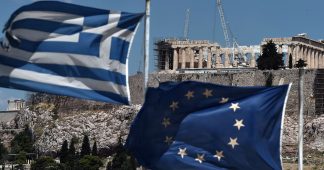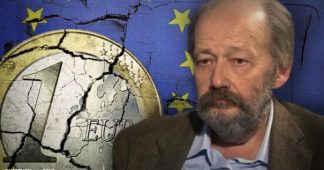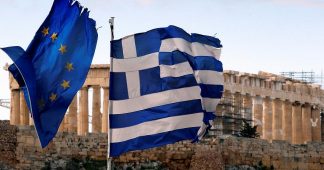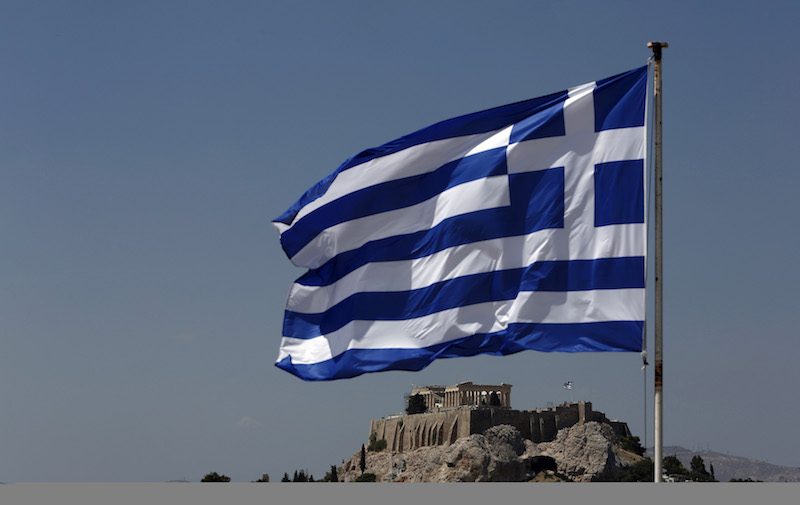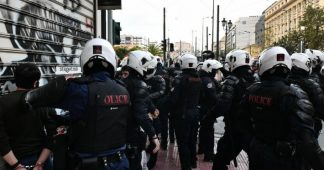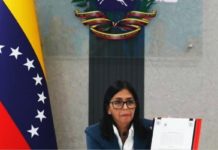The Greek Debt Crisis is Finally Over. Or Is It?
By Dimitris Konstantakopoulos
04.07.2018
Greece still exists, albeit decapitated, without leaders, forces, or intellectuals to articulate its truth and its rights. And as it has proved, time and again, in thousands of years of a permanent threatened existence, the Greek people has a unique capacity to produce miracles, when nobody is waiting for them.
The Eurogroup (the Finance Ministers of the EU) decided to stop financing the Greek bailout program. They claim that both the program and the Greek crisis are over. Nothing can be more far away from the truth. In fact, announcements by European and Greek politicians concerning the end of the Bailout program or of the Greek Crisis, are nothing more than a gigantic Potemkin village, reflecting both the enormous impasse of the EU and the fantastic progress of totalitarianism in the Western world.
Greek sovereign debt remains “extremely non sustainable” according to the IMF. In reality, what Eurogroup did was to postpone once more the final decision on Greece. Greece will remain under very tight supervision of the EU until 2060. The IMF will remain in the program, but as an “advisor”. Its policies will remain, not its money. Germany has refused any debt relief, which would be the only solution to the Greek problem now, a method applied to Germany itself in the past, but also to Poland, Iraq and other western clients.
Continue reading at www.defenddemocracy.press
Tsipras and Corbyn: The Year of the European Protest
By Richard Sakwa , Dimitris Konstantakopoulos
Dec. 21, 2015
It happened not only with non-western alternatives (such as the BRICS). The sharp electoral rise of radical protest parties in Europe has shown an increased degree of mainstream instability and clearly limited the scope of its dominance in the modern ideology and political practice. Thus, it is possible to speak about the formation of a new phase of neo-liberal mainstream opposition – the stage of global political legalisation of alternative models of development.
Strengthening of global significance of alternative projects has also led to the revival of the role of ideology and ideological struggle in global politics. Thus, the next decade is obvious to become a time of ideological renaissance. This applies to the increased attention to the “old” ideologies, such as Marxism, and the formation of new ideological trends. Mainstream attempts to marginalise ideological struggle and to label abusively the term “ideology” in practice proved to be ineffective. Thus, the role and evolution of ideologies become the key aspects in assessing the global agenda. What is the future, if you do not move linearly towards liberalisation? How are the ideologies changing? What are traditional concepts replaced with (in case of any replacement)? How is mainstream able to “dissolve”, “digest” those committed to alternative ideas (Tsipras casus is particularly indicative)? How does a global communications medium work as a catalyst for the confrontation of ideologies?
On the other hand, clearly fixed mainstream desire to replace the ideology with values and impose the world the universalisation of neo-liberal values was also used in building of global alternatives. The emphasis on alternative values and the inadmissibility of the universalisation and unification of values and identities took one of the key places. Thus, the clash of values and identities has largely added and reinforced the global ideological struggle. European protest movements, using term “value”, are actively forming in the Western public opinion postulate of the absence of axiological unity within the West itself. It is obviously of paramount importance in the transformation of the global agenda.
Continue reading at valdaiclub.com
Lessons of the Greek Tragedy
By Dimitris Konstantakopoulos
Nov. 21, 2015
Greek and European political elites are the mere tool of gigantic historic forces transforming the whole region. They are the object and not the subject of History. Most European politicians have neither the intellectual capacity, nor any interest and desire to realize what they are really doing! The case of Tsipras and SYRIZA is more interesting, because they represented at some point a privileged “moment” of History. They seemed to hold in their hands a rare, historic opportunity, to become subjects of Greek and European history. They spoiled it.
SYRIZA: From “Radical Left ” to “Radical Neoliberalism”
It was back in 2011, Papandreou was still Prime Minister, when I had a long talk with Tsipras at his office, on a building overlooking the Constitution Square. At this time, I remember, he was interested in establishing contacts with Russia and also with Cyprus. (Already a year later he was more interested in establishing contacts with the USA-Israel axis). He was looking for the new ways for his party and himself, as a new leader, “to do something”. As the discussion came to the situation of the country, I told him: “The ball will come to you”.
I mean that the responsibility for the country could come to SYRIZA. To say this in 2011 seemed a crazy fantasy. Nothing in the horizon would permit to make such a prediction. If I dared it, it was for two reasons. As I believed this country has already embarked on the road of “Weimar course”, referring to the last three years of the Weimar Republic (1929- 1933). It received an external financial attack (unsustainable debt as unsustainable war reparations in the German case) and it was applying exactly the same policy of the German Chancellor Bruenning.
George Soros called it a “death spiral”. This situation rapidly destroyed the economic conditions for the reproduction of the Greek social formation and the institutions of the nation-state and of parliamentary democracy including Greek political system. The two main parties ruling in Greece since 1974 did not seem able or willing to resist this course. It would be only natural for society, for the Nation, to ask for a way out, to trust whatever political subjects they could probably find. SYRIZA, for various reasons, was the main candidate.
Continue reading at www.defenddemocracy.press
